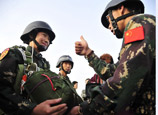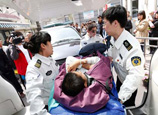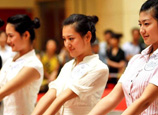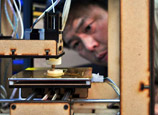
WASHINGTON, May 17 (Xinhua) -- China's Ambassador to the United States Cui Tiankai on Friday urged Washington to remain "truly neutral" on the Sino-Japanese territorial dispute in East China Sea by honoring its promise to "take no side."
In an interview published by the U.S. magazine Foreign Affairs on its website, Cui blamed Japan for creating the dispute and tensions over the Diaoyu Islands by taking the move to "nationalize" the islands last year, breaking a previous agreement to put the dispute aside.
"When China and Japan normalized relations with each other, the leaders of both countries decided to put such disputes aside ... We had tranquility over these islands for many years, until the Japanese government decided to nationalize the islands last year," the Chinese envoy said. "The legal action taken by the Japanese government really provoked everything."
Cui said that, in order to resolve the dispute, China and Japan have to engage in very serious negotiations, but Tokyo is unwilling to make any serious efforts to "start very serious talks."
As to what role the United States can play in helping resolve the China-Japan dispute, Cui said that "the most helpful thing the U.S. could do is to remain truly neutral, to take no side."
He said it seems that Washington has not yet fulfilled its promise to remain neutral on the Diaoyu Islands dispute. "When the United States talks to us, they say they'll take no side, but sometimes, when they talk to the Japanese or when they make public statements, we hear something different," he said, referring to the U.S. stance on the dispute.
Washington has repeatedly stated that it takes no side on the conflicting claims on Diaoyu Islands, which are historically part of China's territory, but opposes unilateral moves to damage the so-called Japan's administration of the islands. China has complained that the United States ignores the fact that it was Japan which first took unilateral steps to change the status quo.
On the China-U.S. relationship, Cui said that it has been "moving forward steadily" in the last four years. "I think there is a clear mutual understanding between the two governments about the need to have a constructive and steady relationship -- to base our partnership on mutual respect and mutual benefit," he said.
The two countries are determined to not allow the history of zero-sum game between a rising power and an existing one to repeat itself, through developing a new type of great-power relationship, Cui said, adding that this is a long-term goal for the two countries.
In the interview, the veteran Chinese diplomat also refuted the U.S. allegations of Chinese cyber attacks against American computer networks, citing that the United States has not had hard evidence to prove them.
Moreover, he noted, the United States is much more advanced than China in terms of the development of information technologies and "is in better position both to defend itself and to maybe go on the offensive against others."
Cui said the two sides should sit down to work out a new set of rules on cybersecurity, and find out ways that "we can work together to prevent such attacks from happening again."
On the tensions on the Korean Peninsula, the Chinese envoy said that China and the United States have many common interests on the issue, though they might also have "slightly different approaches on how to reach our common goals."
China is advocating three principles in its policy on the Korean Peninsula, namely standing for stability, for denuclearization and for peaceful means to resolve the differences, Cui said, adding that China will do whatever is necessary to achieve the goals of denuclearization and stability on the peninsula.
"And our influence over the DPRK (the Democratic People's Republic of Korea) may not be as real as what is reported in the media," he said in response to the claims that China has unique ways of putting pressure on the DPRK and should put real pressure on it.
On the Syrian crisis, Cui said China follows the principle that "the affairs of a particular country should be determined by its own people," adding that "It's not up to China or the United States to decide the future of the country."
















 Deaths prompt concerns over elevator safety
Deaths prompt concerns over elevator safety


![]()
